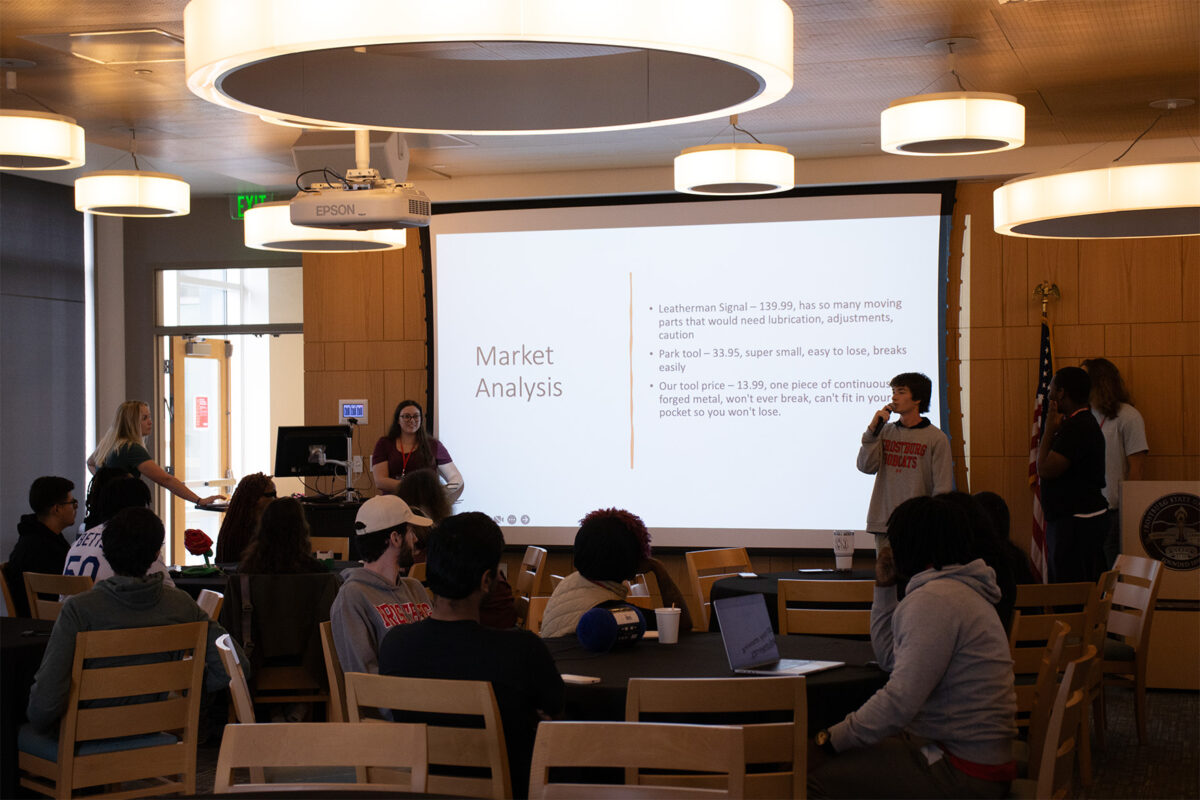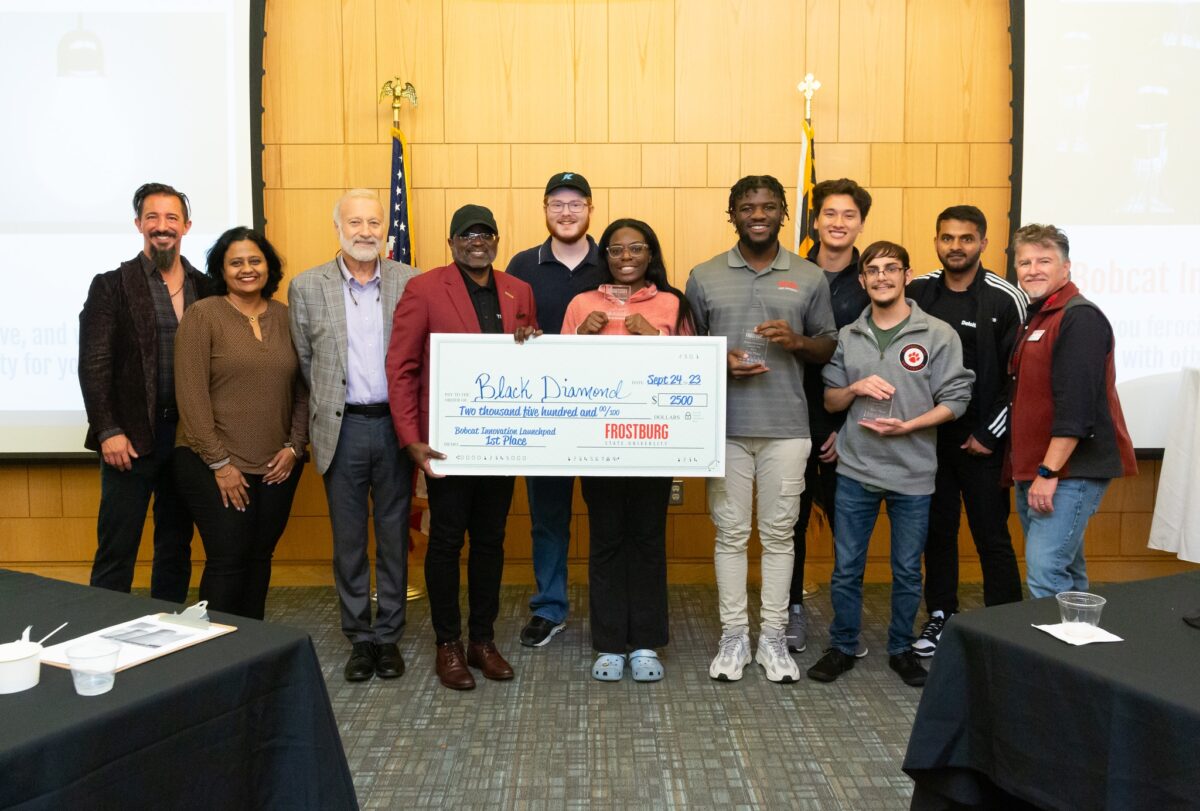Dr. Arti Santhanam realized she’d have to try something different. It was fall 2022, and the former executive director of TEDCO’s Maryland Innovation Initiative (MII) was looking for a way to promote commercialization efforts for universities with limited research budgets.
What resulted was a series of investments outside of the MII’s regular parameters — including a unique event that blended elements of a hackathon with those of a business pitch competition.
“We took it upon ourselves as an opportunity to envision a program that brought us to comprehensive universities,” Santhanam said, “and can bring in students and faculty, aspects of entrepreneurship training, [and] connections to different industries while allowing them to create some intellectual property that they could benefit from.”
Generally, the MII is a program that funds efforts to commercialize technology coming from university-based research. It was created as a collaboration between the state government — which supports TEDCO — and five research institutions: the University of Maryland, College Park, Johns Hopkins University, the University of Maryland, Baltimore County, Morgan State University, and the University of Maryland, Baltimore.
In 2022, MII sought to expand their reach, investing nearly $330,000 in three pilot programs for Bowie State University and Frostburg State University (FSU). While each program aimed to encourage university-based entrepreneurship, none did so in as unique a fashion as FSU’s regional Bobcat Innovation Launch Pad that took place in late September 2023.
To avoid alienating students with disciplines outside of the technology realm, MII and FSU steered clear of marketing the competition as a hackathon. Roughly 50 students comprising seven different majors — including nursing, biology, mass communication and more — participated in the three-day event.
Each team was given a problem statement pertaining to climate change and environmental, science and governance (ESG).
The students had two days to come up with a technical solution, and ended the experience on the final day dedicating their time to pulling together a business pitch for their innovative ideas.
The structure thrust students from varying departments into interactions with each other, across age and experience from first-year undergrads to graduate students, providing a preview of post-university life and helping them refine their communication and leadership skills.
“They grew months of academic, professional, [and] emotional maturity in those three days,” said Dr. Michael Flinn, FSU professor and chair of the Department of Computer Science and Information Technologies. “One of the things they learned is [that] everybody has something valuable to contribute to the conversation.”
Teaching collaboration and communication, along with innovation
Computer science major Courage Tikum, a senior at FSU, was initially reluctant about participating in the event due to uncertainty about what it would entail, but that quickly changed once the competition began.
“It was diverse for all types of students, and it wasn’t just something that was catered toward the computer science department,” Tikum said. “It was something completely different.”

TEDCO collaborated with Deloitte’s Innovation Lab to provide mentors that guided the groups throughout the competition. The Big Four accounting firm’s mentors steered students in the right direction if they were getting off course, which was a common issue among these varied teams.
Tikum’s team, which took the name Black Diamond, took on the task of figuring out how to distribute humanitarian aid more efficiently. With four computer science majors and a lone business major — first-year student Zaniah Kwaw — the team was somewhat lopsided, per Tikum, who said at first, they were too focused on finding a tech-related solution and ignored Kwaw’s business perspective – a perspective they later came to rely on.
Although the early struggles were frustrating, Tikum said, in the long run they were beneficial because they forced the team to communicate more openly and adjust how they were approaching the problem.
“It was a good thing,” he said, “because you get a good representation of what it is like outside in the real world. And on top of that, you get another perspective from somebody else that might actually open up what you were thinking about and lead you to new solutions.”
That sentiment was echoed by several underclassmen at the event, according to FSU Vice President for Regional Development and Engagement Al Delia. Those he spoke with were grateful for the way the Innovation Launch Pad reshaped their perspectives on how they’d approach their lives after college.
“We wanted to make sure that we created a microcosm of those experiences that they’re going to have through life,” Delia said. “To have that realization and that understanding at the beginning of the process rather than two years into that four-year process is really just extraordinary for them.”
‘Opening up opportunities for student-generated solutions’
The Black Diamond team’s willingness to bounce ideas off of each other and create what computer science major Tikum called “positive friction” helped them develop their idea: the “life box” – a cube that stored basic provisions like food, water and first aid in insulated fabric. The innovative design also included extendable and retractable poles so it could be used as a tent.
How might they bring it to market? The teammates created a business plan to sell life boxes to the government so they could be distributed across the globe.
This unique solution and business plan helped Black Diamond secure first place, receiving a cash prize of $2,500. The University System of Maryland Launch Fund sponsored the prize money for this competition, which will go toward developing the ideas from the top three teams into commercially viable products.

Now, Tikum is working on getting the rest of the team on board to partner with Delia and FSU to start actually developing the life box.
While commercial success would be a massive victory for the winning teams, the idea is that for all the students, the life skills they grasped throughout the competition will be equally invaluable when they start their careers.
“It gives them a confidence of going into the real world and approaching problems in a holistic manner,” said Santhanam, the former MII executive director. “Not being afraid of asking for help and knowing that help could come from any corner, being confident in their own abilities, and not being afraid of going into a new workplace.”
MII plans to analyze the impact of the Innovation Launch Pad, she said, to determine whether it’s effective enough to be implemented at other comprehensive universities moving forward.
“We can then create a more permanent programming for not just Bowie and Frostburg, but maybe perhaps for all of the comprehensives in the state,” Santhanam said. “We want to make sure that we’re opening up opportunities for student-generated solutions to problems that the young people see in their daily lives.







